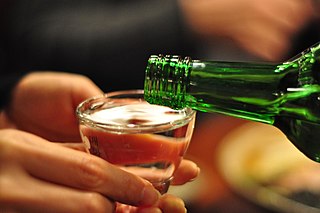
Busan, officially known as Busan Metropolitan City, is South Korea's most populous city after Seoul, with a population of over 3.4 million inhabitants. Formerly romanized as Pusan, it is the economic, cultural and educational center of southeastern South Korea, with its port being Korea's busiest and the sixth-busiest in the world. The surrounding "Southeastern Maritime Industrial Region" is South Korea's largest industrial area. The large volumes of port traffic and urban population in excess of 1 million make Busan a Large-Port metropolis using the Southampton System of Port-City classification.

Soju is a clear and colorless Korean distilled alcoholic beverage. It is usually consumed neat. Its alcohol content varies from about 12.9% to 53% alcohol by volume (ABV), although since 2007 low alcohol soju below 20% has become more popular.

Ulsan, officially the Ulsan Metropolitan City is South Korea's seventh-largest metropolitan city and the eighth-largest city overall, with a population of over 1.1 million inhabitants. It is located in the south-east of the country, neighboring Busan to the south and facing Gyeongju to the north.

The Donghae Nambu Line is a railway line connecting Busan to Pohang in South Korea. The line runs along South Korea's east coast. On December 30, 2016, it was merged into Donghae Line.

Ulsan Hyundai FC is a South Korean professional football club based in Ulsan that competes in the K League 1, the top tier of South Korean football. Founded in 1983 as Hyundai Horang-i, they joined the K League in 1984. Their home ground is Ulsan Munsu Football Stadium. The club is owned by Hyundai Heavy Industries.

Kim Young-kwang is a South Korean footballer who plays for Seongnam FC as a goalkeeper.

Yoo Sang-chul was a South Korean football player and manager. Yoo was regarded as one of the greatest South Korean midfielders of all time. He was selected as a midfielder of the 2002 FIFA World Cup All-Star Team and K League 30th Anniversary Best XI.

Park Jin-sub is a former South Korean football defender and current manager of Busan IPark.

Nam District (Nam-gu) is a district of Ulsan, South Korea. Its name literally means "South Ward".
Yoon Bit-garam is a South Korean professional association football player.
Lotte Hotels and Resorts is a South Korean luxury hotel chain operated by Lotte Hotel Co., Ltd., the hospitality arm of Lotte Corporation. The company was founded in May 1973. Starting with the opening of Lotte Hotel Seoul in 1979, luxury chain hotels opened in Jamsil, Busan, Jeju, and Ulsan. The first business hotel, Lotte City Hotel Mapo, opened in April 2009, and the first overseas chain, Lotte Hotel Moscow, opened in June 2010. On December 8, 2011, the second business hotel, Lotte City Hotel Gimpo Airport opened within the Lotte Mall Gimpo Airport complex.

Yun Il-lok is a South Korean professional footballer who plays for Ulsan Hyundai in the South Korean K League 1. He has played for a number of youth-level teams representing South Korea, and in 2013 graduated to his country's senior men's side, winning the EAFF E-1 Football Championship in 2017 and 2019 as well as gold medal at the 2014 Asian Games.
The Busan–Ulsan Expressway Co., Ltd., operating as the Busan–Ulsan Expressway, is a limited company in South Korea, it made and is operating Haeundae IC – Ulsan JC section of Donghae Expressway, connecting Haeundae District, Busan to Ulju County, Ulsan.

Ulsan College is a private college with two campuses in Ulsan, South Korea. The East Campus is in Dong-gu and the West Campus in Nam-gu. It was founded on 8 April 1960 as the Ulsan Industrial Technology Institute. Hyundai Heavy Industries is the college's owner and financial sponsor.
Ulsan Science Museum is a science museum located in Ok-dong, Nam-gu, Ulsan, South Korea. Established in 2011, the museum has an area of 41,000 square metres spread out over 6 floors. There is space for several exhibitions, a planetarium, and science labs and classrooms for educational courses. The exhibitions are almost entirely in Korean, but there are also English programs available for visiting schools.
Jangsaengpo Whale Museum is a history museum located in Jangsaengpo, Nam-gu, Ulsan, South Korea. It is the only whale museum in South Korea. The museum details Ulsan's history of whaling. Whaling was banned in South Korea in 1986, but whaling artifacts were kept and are now on display in the museum which is built in what was once a central whaling area. It has a 6,946 square metres of floor space and includes a dolphinarium where visitors can watch dolphin acrobatic performances, and a 4D theatre.
Ulsan Grand Park is the largest urban park in South Korea, with 3.69 square kilometres of park land. It is located in Ulsan Metropolitan City, and includes walking trails, a nature learning center, a botanical garden, a petting zoo, a butterfly zoo, and several playgrounds.
Ulsan Culture & Arts Center is an arts center located in Dal-dong, Nam-gu, Ulsan, South Korea. Construction of the building began in 1990 and the center opened on 5 October 1995. It was previously named the Jonghap Culture & Arts Center (Korean: 종합문화예술회관) but was renamed in 1997. It is the site of the annual Cheoyong Culture Festival, which accompanies the Ulsan World Music Festival and the Asia Pacific Music Meeting.











